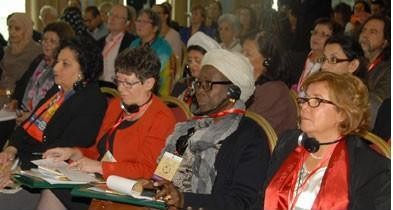Interreligious Symposium in Rabat
«To create a network of women, going beyond the diversity of religion and culture; to make an in-depth study of the sacred texts so as to regain the place of the woman in today’s society; and to promote interreligious dialogue with a more human dimension»; here are some of the conclusions of the International Symposium that took place last November 12 and 13, in Rabat, the capital of Morocco.
Organized by the Centre for Women’s Studies in Islam, affiliated with the Moroccan Council of Ulama, the meeting took place within the framework of the Strategic Dialogue between Morocco and the United Staes under the patronage of King Mohammed VI.
Around a hundred experts were present coming from 25 nations, the majority of whome were Muslim, but there were also some Christians and Jews, all of them scholars and involved in the juridical field and in organizations working for women’s rights.
The meeting, entitled “Women at the heart of the monotheisms: a pluralist history”, tackled the important contribution of women in interreligious dialogue, where often their voice has remained marginilized.
The meeting started with a presentation of the role of the woman in the history of the three monotheistic religions. And therefore, the importance of starting from the sacred texts was underlined instead of the logics of the split, with the objective of finding once more the dignity of the woman, aiming for a greater equality between man and woman, both on the spiritual, as well as moral and social levels. From this point, the correct interpretation of the texts on the female person was seen as necessary since it was often conditioned by the customs of the times and by other factors: political, economical and social.
Christina Lee, co-responsible for interreligious dialogue of the Focolare Movement, presented the experience, in interreligious dialogue, of the Focolare Movement founded by a woman, Chiara Lubich. She spoke of the “feminine genius” – as John Paul II defined it – which is the ability of women to live for others, to take care of the others and to connect relationships among people. This vision was appreciated for its depth, for its spirituality and for its future prospects.
The presence of the youth was not lacking with their experiences and expectations, that highlighted the crucial role that the woman plays in building the unity of the human family. Just as Prof. Asma Lamrabet, diretor of the Study Center, affirmed «the symposium was already a reality and a challenge, and no longer just a dream».


